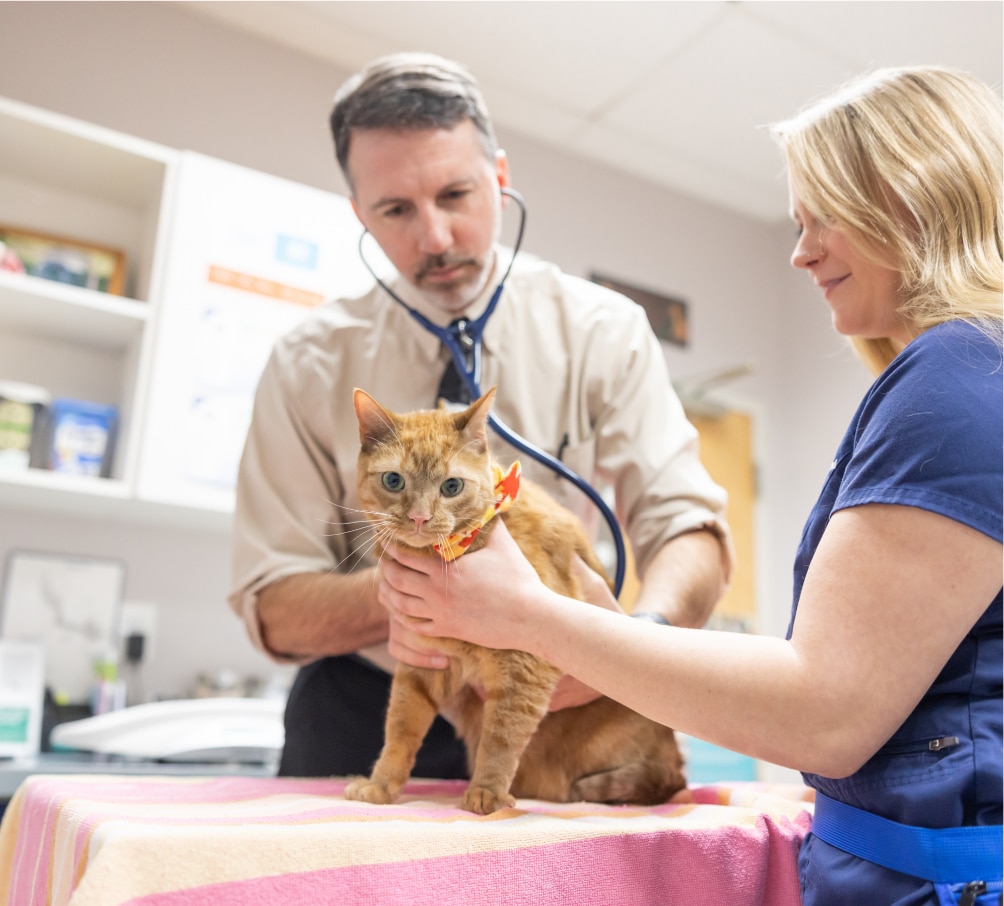When your pet has an accident in the house, it could easily be nothing. Maybe he was unable to get outside quick enough, or his litter box was dirty.
But if the issues persist, and other symptoms begin to emerge, it could be a red flag that something is seriously wrong.
Other urinary symptoms include blood in the urine, straining to urinate, and abnormally small or large amounts of urine. They may be accompanied by lethargy, fever, pain, or restlessness.
If you notice any of these symptoms in your male pet, contact your vet right away. Read on to discover potential causes and treatments of urinary issues in male pets.
Common Causes For Urinary Issues in Pets:
Urinary Tract Infection (UTI)
Infections of the urinary anatomy are more common in female pets, but they can also occur in males as well. Also known as bacterial cystitis, this could be a simple infection that requires antibiotics. But it could also be a secondary symptom caused by a larger issue, such as cancer.
Prostatic Disease
Urinary symptoms might also indicate disease of the prostate gland. This is most common in unneutered dogs. If your pet has trouble urinating or defecating, or if he is passing blood, this could be the cause.
Bladder Stones
Stones, also known as uroliths, are composed of a variety of minerals, such as struvite, calcium oxalate, and urate. These hard build-ups can inflame the urinary tract and cause pain for your pet.
Kidney Failure
There are two types of kidney failure: Acute and chronic. Acute kidney failure develops rapidly and is often fatal. The best chance for survival is early and aggressive treatment. Acute kidney failure may develop as a result of exposure to a toxin, infection, or as the end stage of chronic kidney disease. Chronic, on the other hand, can occur with age or the progression of other diseases. In many cases, chronic kidney disease may be managed for months or even years.
Urinary Blockage
A urinary blockage occurs when the urethra is blocked by inflammatory material. The pet will be unable to pass urine, causing the bladder to become painfully hyperdistended. The longer the blockage remains, the more damage it will do to the bladder, kidneys, and surrounding organs. This is an emergency. If not treated rapidly, it can be fatal.
Urinary Incontinence
Finally, when pets get older, they may have a deficiency in hormones and a weakening of muscles, including the urethral sphincter. This means they cannot effectively hold in their waste material. You may notice them peeing or pooping in their sleep or at other strange times.
Spraying (Male Cats)
In male cats specifically, you may notice a spraying behavior. Also known as urine marking, this happens when a cat aims urine at a vertical surface, without squatting, and holds his tail straight in the air.
It is most common in unneutered males but also occurs in neutered males. Sometimes it is used to find a potential mate, so neutering the cat can help alleviate this behavior. Other times, it occurs because the cat is stressed or insecure about his space.
Learn more about why cats spray here.
How Urinary Issues Are Diagnosed & Treated
When you bring your pet in for urinary issues, the vet will need to conduct a few different diagnostic tests to determine the cause.
This will typically include a blood panel, a urinalysis, and potentially a fecal analysis. The lab will test the chemicals and hormones within the bodily fluids to determine the cause of the issue.
The vet will also physically examine your pet’s abdomen and check for areas of swelling. Finally, an X-ray may be needed to locate stones or swollen organs.
The treatment of the urinary issue will depend on the cause. Antibiotics can be prescribed to fight infections. If the pet has not urinated in a long time, a catheter may be inserted to relieve him. This can also help to remove blockages.
For cancer, possible treatments include surgery, radiation, and chemotherapy. Surgery may also be necessary to remove stones.
Unfortunately, some diseases associated with old age have no cure. This includes chronic kidney failure and incontinence. Medicine can be prescribed to slow the progression of the illness and provide more comfort for your pet.
Prevention of Urinary Issues in Pets
To prevent urinary issues, keep your pet healthy with a good diet and plenty of exercise. Provide plenty of water, especially in hot weather.
You should also aim to minimize stress, especially for male cats, who can be a bit territorial. Ensure there are enough resources for all pets in the household, and separate aggressive animals.
Finally, you will want to check your pet regularly. Keep an eye out for any signs of discomfort, and feel his abdomen for any swelling. Every now and then, watch him while he goes potty to make sure he is having no issues.
When it comes to urinary problems, time is of the essence. The sooner you notice something wrong, the sooner he can be treated, and the lesser the ultimate damage will be.
Trusted Animal Hospital in Frederick, MD
If your furry friend is showing concerning signs, bring him to Old Farm Veterinary Hospital. Our caring vets will diagnose his issue and provide the treatment he needs to feel better.
We are conveniently located in Frederick, Maryland, and proud to serve the surrounding areas. Call now to schedule an appointment.



